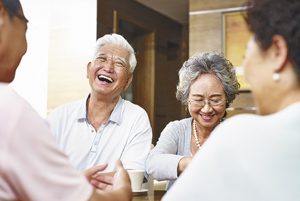By Sebastien Saitta
 “Grow old along with me! The best is yet to be, the last of life, for which the first was made. Our times are in his hand who saith, ‘A whole I planned, youth shows but half;’ Trust God: See all, nor be afraid!”
“Grow old along with me! The best is yet to be, the last of life, for which the first was made. Our times are in his hand who saith, ‘A whole I planned, youth shows but half;’ Trust God: See all, nor be afraid!”
Nineteenth-century English Poet, Robert Browning’s celebratory vision of old age in his poem, “Rabbi Ben Ezra,” rarely finds its way around these days.
In a world of Botox, supplements, skin-tightening serums, face-lifts, tucks, and photo filters promising to turn back the hands of time, it is evident that most of us struggle to come to terms with aging. We all want to live longer, but we don’t want to get older.
Despite all the fighting back with billions of dollars spent on anti-aging each year, it’s time to face reality. Nature always wins in the long run. It has all the time in the world. We don’t. Wrinkles begin to show, hair will gray and joints start to stiffen, among other so-called harsh realities that come with getting older. While this inevitable truth is tough to accept for many, perhaps it’s time to take a page out of the Okinawan playbook.
In Okinawa, Japan, one of five Blue Zones in the world where people live the longest and healthiest, age is something to be celebrated rather than feared — so much so that even the country of Japan as a whole designated a public holiday known as Respect for the Aged Day. Celebrated on the third Monday of every September, the government presents a commemorative sake cup to those who have turned 100 in the past year. There is a lot of celebrating to do, too, as 2020 data from the Japanese government shows that there were 80,450 people aged 100 that year. There is even an Okinawan village, called Kitanakagusuku, that holds a yearly pageant to honor women aged 80 and older.
So, what exactly is the longevity secret that draws celebration from an entire country? According to National Geographic researcher and Blue Zones founder Dan Buettner, there are nine principles. These principles are shared by all five Blue Zones and are known as the Power 9. Okinawans have a unique saying to support several of these principles that can be followed no matter your geographical location.
Ikigai
Pronounced ee-kee-guy, this saying roughly translates as “the reason you get up in the morning.”
Okinawans keep busy discovering and doing things that give their life meaning or purpose. According to Buettner, focusing on your purpose can add up to seven good years to your life. He notes that the year one retires can also be one of the most dangerous because of the sudden lack of purpose experienced.
Moai
Moai (mo-eye) is a term that means meeting for a common purpose.
Women in Okinawa (who make up 88% of the centenarian population) often get together in groups to talk about life, gossip or share advice. This serves as a social support group where they feel cared for. They simply enjoy each other’s company. This helps keep stress levels low while enhancing feel-good chemicals in the brain that support overall health. Some of these groups were even paired as young children when the commitment was made for their entire life.
Hara Hachi Bu
Okinawans use this term to remind themselves to stop eating when they are 80% full. This goes a long way in the prevention of overeating and unnecessary weight gain.
Since it typically takes 20 minutes for the brain to receive the signal from the stomach that we’re full, it usually turns out that when you think you’re 80% full, you’re actually full. Ways that help Okinawans practice this include eating mindfully and also being in the company of others to allow for conversation in between bites.
Find out your body’s biological or real age and receive personalized resources to help you live longer, happier and healthier like the Okinawans by taking Blue Zones Project’s RealAge health assessment. Visit bzpsouthwestflorida.sharecare.com.









